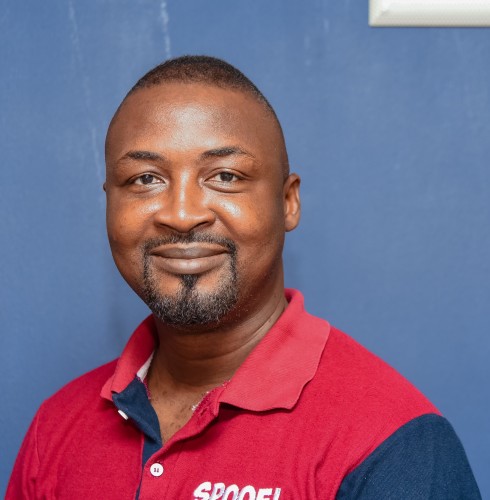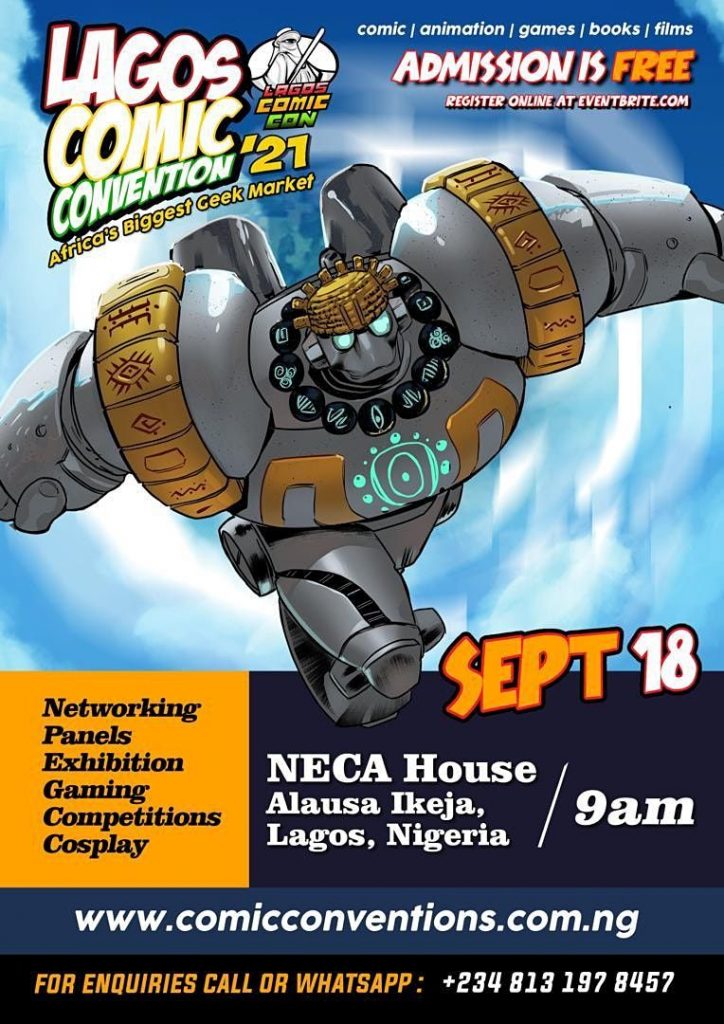The first Lagos Comic Con took place in September 2012, with about 300 guests in attendance. Today, it has become West Africa’s top destination for lovers of all things comic books, gaming, animation, films, and art in general. Via various exhibitions, panel sessions, masterclasses, and cosplaying, this phenomenal event creates a business platform for artists to have the chance to display their skills and talents, sell their products, and possibly meet potential investors. Moreover, it has become one of the best platforms and avenues in West Africa for people in the creative industry to connect with their audience.
Lagos Comic Con breathes life into the Nigerian comic art industry. The Nigerian comic art scene is what one can call “low-key,” considering how few people here are willing to see comics as a valid art medium. This is evident in how comic art in Nigeria is not as prominent as the music or movie scene. In fact, a good number of adults see comics as child’s play. “What serious adult would dabble in comic art, either creating or consuming it?”

This condescending manner in which most Nigerians perceive comics inspired Ayodele Elegba, founder of Lagos Comic Con and Creative Director of Spoof Media, to set the ball in motion to bring about Lagos Comic Con. Talking with me recently, he said, “I was tired of not being able to be myself. At the time, being a geek was not as popular as it is today. Then you were looked upon as an outlaw or an ‘unserious’ adult who doesn’t want to grow up when you are caught reading a comic. I believe there were more people out there, who, at my age, still enjoyed comic books. Also, I noticed that even though we had very good comic creators, they didn’t have any platform where they could showcase their talent to the rest of the world. I got tired of waiting, so I created Lagos Comic Con to celebrate Africa.”
Working as a comic artist for the past four years, I have come to realize the importance of a comic convention here in Nigeria. Lagos Comic Con is doing a great job of giving comic artists like myself a platform to sell themselves. Moreover, it creates an avenue for us to network with other comic artists, people we could collaborate with in different projects, and comic lovers.
Joseph Ulonna, the founder of J.Empire Comics, shares a similar sentiment. For him, Lagos Comic Con is an opportunity for people all around the continent to promote their comics. He further expressed why he believes this event is poignant. “People out there, in different parts of the world, want to see African comics, how we portray our own superheroes. They want to see what we can offer to the world. I feel Comic Con makes us showcase our talents. Comic Con gives us an opportunity to do just that.”
When I asked Ulonna if the event has benefited him as an artist, he replied in the affirmative, “Yes, it has given me lots of benefits. It has given me room to express myself by sharing my opinions with a large audience on how to move the Nigerian comic industry to the next level. Also, it has helped me with networking with other artists and clients. I love to make friends. Somehow seeing the awesome things other artists are doing has a way of challenging you to do better. Personally, I feel an upcoming artist in this industry would be missing out on several good things if they don’t attend this event.”
This year’s Lagos Comic Con would be Ulonna’s first exhibition at the event. “Seeing how other people seemed to have achieved so much from putting their work out there, I felt inspired to do the same. I expect a lot of things – clients, investors, collaborators, you name it.”

In recent times, the number of attendees has skyrocketed from the original 300 in 2012 to approximately 4,000 people this year! This, of course, brings with it its share of new challenges organizing Lagos Comic Con. So much goes into the process of turning big ideas into reality. Elegba told me money has been the major challenge so far. “We always have to go cap in hand each year to ask for money.” He went on, “We are, however, currently restructuring the event so that the event can actually pay for itself. I must say it gets easier with each passing year as vendors don’t need convincing anymore about the large crowd that comes each year.”
Despite not having a huge advertising budget like other events, Lagos Comic Con has been able to thrive. Elegba eventually sees Lagos Comic Con getting huge enough to the point where people would be very willing to get tickets for the event, thereby making it unnecessary to keep relying on sponsorship. He goes on to add, “We are also hoping to have spin off conventions in other states here in Nigeria, like Abuja and Portharcourt.”
As stated earlier, Lagos Comic Con is vital to the Nigerian comic industry, considering how the industry has grown since 2012. People are gradually paying attention to comics and animations, and embracing them as viable art mediums. Elegba agrees that the Nigerian comic scene has grown fast since the start of the convention. He further expresses, “Now we are big enough to the point where we have a lot of creators working abroad with international studios and publishers. However, I believe we may now have a brain drain on our hands, as more Nigerian creators prefer to work for foreign clients and earn in foreign currencies instead of working with publishers at home.”
Ulonna sheds more light on the issue of working for foreign clients. He says, “I don’t know if I prefer working with clients out of the country or clients in the country. These two have their pros and cons. In terms of Nigerian clients, they have a way of under-pricing your work, as though they do not even value you at all.
“This is not the case with foreign clients. When they know you are good at what you do, they do not hesitate to make a decent payment. And when you convert into local currency, it is a lot of money. However, there is a disadvantage of working with people out of the country. I have had experiences where a client pulled out at the last minute, saying they were not interested in working with me, after we had negotiated. In other cases, I have had cause to watermark my work with my logo before sending it out to the clients. That way, they were ‘motivated’ to pay for my work after I sent it over to them. There are pros and cons of working with foreign clients.”
I see more and more Nigerians embracing comics and animations every day, which is bringing about more favorable conditions for comic artists and animators who decide to work with Nigerian clients, publishers, and producers, etc. Based on how much success and positive reputation Lagos Comic Con has garnered since its inception, continued growth is almost assured. So far, Lagos Comic Con has served the functions for which it was created, both manifest and latent, for comic artists and lovers of comic books.
SOLRAD is made possible by the generous donations of readers like you. Support our Patreon campaign, or make a tax-deductible donation to our publisher, Fieldmouse Press, today.

Leave a Reply